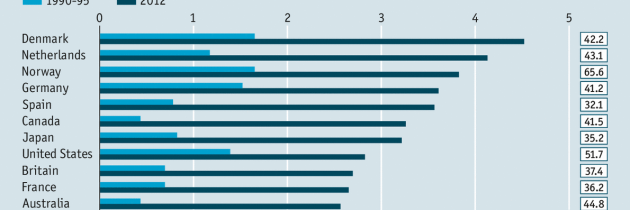Environmental regulations may not cost as much as governments and businesses fear
What are the economic effects of environmental policies? It sounds painfully obvious, but the answer depends on how strict those policies are. So how do you quantify that? One of the dirty secrets of green economics is that, until now, no one has had a good measure of environmental strictness. One or two narrow indicators have been developed. The European Bank for Reconstruction and Development, for example, has an index of climate-policy stringency for 2011. But there is no standard measure comparing the effects of different policies, assessing countries’ overall policy stance and calculating how these have changed over time.
This lack reflects problems in the underlying data. So-called environmental services—disposing of waste or cleaning up the air—are not included in traditional measures of productivity. So if their inputs or outputs change (and they have changed a lot over 20 years) the results will not show up in the numbers. Environmental policies also influence the stock of capital—for example, by making some technologies obsolete. But depreciation rates in national accounts rarely allow for such effects.
This does not mean it has been impossible to study climate policies. But without macro-environmental indicators, studies have largely been restricted to individual laws, such as America’s Clean Air Act. For the most part, they have found that these laws have little impact. As a recent review of the literature* concluded, the effects on “employment and productivity…appear to be small and transitory…the estimated effects…on trade and investment location so far are negligible.” That is fine, as far as it goes. But national climate policies are increasingly ambitious, ranging from vehicle-emission standards and clean-water requirements to controls on power stations. Policymakers need to know not just the impact of individual measures but the combined effect of all their environmental policies.
Now, they finally have some hard figures. Researchers at the Organisation for Economic Co-operation and Development (OECD), a club mostly of rich countries, recently constructed the first comprehensive set of data on environmental strictness and its effect on productivity.† The researchers got around the difficulties of incomplete national accounts by calculating an index based on the explicit or implicit price of green policies. If a price is explicit—say, that of a traded pollution permit—the calculation is reasonably straightforward. If it is implicit—arising from restrictions on vehicle emissions, for example—the researchers estimated a relative score based on a scale of zero to six (zero means the policy is absent; six represents the most stringent measure in force). They combined this and other data to create a composite indicator of “environmental policy stringency” (EPS) for 24 OECD countries from 1990 to 2012. Using the ORBIS database of information on 44m companies, they were then able to calculate how changes in the EPS indicator affected manufacturing firms.
Measure for measure
In most respects, the results are not a surprise. The strictest policies are in Nordic countries and the Netherlands; the laxest are in Greece and Ireland; Britain and America are near the OECD average. Policies everywhere have become stricter since 1990. More importantly, the new study confirms earlier findings about the impact of individual measures: “an increase in stringency of environmental policies does not harm productivity growth.” This contradicts what most governments and companies seem to believe: that green rules may be justified by the need to save the planet but impose immediate economic costs.
There are several possible explanations for the finding. One is that damage from environmental regulation is not great enough to change the overall productivity figures. A rule of thumb says a 10% change in the oil price is associated with a 0.2% change in GDP, so if green taxes push up energy prices by only a few cents, their macroeconomic impact might be modest. The effect on jobs, investment or trade, though, might be greater.
Another explanation may be that stricter environmental regulations do as much good as harm. According to this line of reasoning, which is associated with Michael Porter of Harvard Business School, such rules encourage firms to invest more in efficiencies and innovations than they would have otherwise. The study finds indirect evidence in some firms, though not all. It reckons that a shift from the lowest (Greek) levels of environmental stringency to the highest (Danish) ones further boosts productivity in the most productive manufacturing firms by 0.2-0.6%. But it reduces productivity, by 0.1-0.3%, in firms that were already less productive. In other words, the level of productivity affects the impact of green rules more than, say, the amount of pollution. This suggests that green policies make a bigger difference at the level of the firm than to the economy as a whole.
Lastly, it is possible that the kind of environmental policy matters a lot—whether it is broadly market-based (such as a carbon price) or not (such as bans or regulations). To measure this, the researchers constructed a second index, using a questionnaire to look at matters such as the administrative burden associated with getting an environmental permit or whether new firms face higher barriers to entry as a result of green rules. The index is only a snapshot—but is enough to show that environmental strictness and market-friendliness are not the same. The Netherlands is strict but competition-friendly; Italy is lax but anti-competitive; Germany is strict and burdensome. Perhaps countries should pay as much attention to the quality of their environmental legislation as to its stringency.
* “The impacts of environmental regulations on competitiveness.” By Antoine Dechezleprêtre and Misato Sato. Grantham Research Institute, 2014.
Fonte: The Economist



